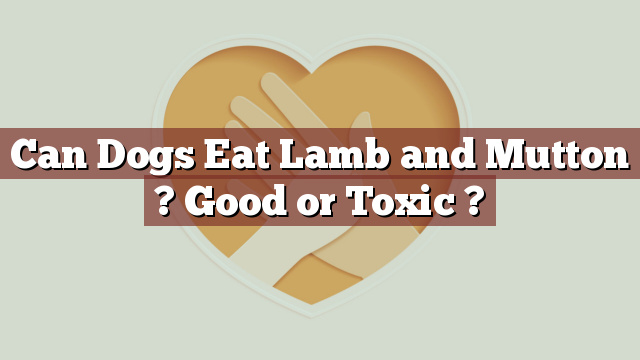Can Dogs Eat Lamb and Mutton? Good or Toxic?
It is important for pet owners to be knowledgeable about the foods that are safe and healthy for their dogs. While some human foods can be shared with our furry friends, others can be harmful or even toxic to them. One such food that may raise questions among dog owners is lamb and mutton. In this article, we will explore the nutritional value of lamb and mutton for dogs, whether it is safe for them to consume, as well as potential risks and benefits associated with feeding dogs lamb and mutton.
Nutritional Value of Lamb and Mutton for Dogs
Lamb and mutton are excellent sources of protein for dogs. Protein is an essential nutrient that helps build and repair tissues, support a healthy immune system, and provide energy. These meats also contain essential amino acids that are necessary for the overall well-being of dogs. Additionally, lamb and mutton are rich in vitamins and minerals such as vitamin B12, iron, and zinc, which are important for a dog’s overall health.
Is it Safe for Dogs to Eat Lamb and Mutton?
Yes, dogs can safely consume lamb and mutton as long as it is properly cooked and served in moderation. Raw or undercooked lamb and mutton can pose a risk of bacterial infections that may lead to digestive upset or more serious health issues. It is crucial to ensure that the meat is thoroughly cooked to kill any potential pathogens.
However, it is worth noting that while lamb and mutton are generally safe for dogs, some dogs may have allergies or sensitivities to certain types of meat, including lamb. If you are introducing lamb or mutton to your dog’s diet for the first time, it is advisable to do so gradually and monitor their reaction for any signs of allergies or digestive issues.
Potential Risks and Benefits of Lamb and Mutton for Dogs
Feeding lamb and mutton to dogs in moderate amounts can have several benefits. As mentioned earlier, these meats are rich in protein, vitamins, and minerals, which contribute to a balanced diet for dogs. The protein content helps support muscle development and maintenance, while the vitamins and minerals promote overall health and vitality.
However, it is important to be cautious of certain risks associated with lamb and mutton consumption. Fatty cuts of lamb or mutton can be high in calories and may contribute to weight gain or obesity if fed in excess. Additionally, seasoning or marinades used in cooking lamb and mutton may contain ingredients that are harmful to dogs, such as garlic or onion powder. It is essential to avoid using these seasonings and to serve plain, unseasoned lamb or mutton to your dog.
What to Do if Your Dog Eats Lamb or Mutton
If your dog accidentally consumes lamb or mutton, there is usually no cause for immediate concern, especially if it was properly cooked and served in moderation. However, if your dog exhibits any unusual symptoms such as vomiting, diarrhea, or signs of discomfort after consuming lamb or mutton, it is recommended to contact your veterinarian for guidance.
Conclusion: Should Dogs Eat Lamb and Mutton?
In conclusion, dogs can safely eat lamb and mutton as part of a balanced diet. These meats provide valuable nutrients, including protein, vitamins, and minerals, that contribute to a dog’s overall health and well-being. However, it is essential to ensure that the lamb or mutton is properly cooked, served in moderation, and free from harmful seasonings. As with any new addition to your dog’s diet, it is advisable to introduce lamb or mutton gradually and monitor your dog for any adverse reactions. If you have any concerns or questions about feeding lamb or mutton to your dog, consult with your veterinarian for personalized advice.
Thank you for investing your time in exploring [page_title] on Can-Eat.org. Our goal is to provide readers like you with thorough and reliable information about various dietary topics. Each article, including [page_title], stems from diligent research and a passion for understanding the nuances of our food choices. We believe that knowledge is a vital step towards making informed and healthy decisions. However, while "[page_title]" sheds light on its specific topic, it's crucial to remember that everyone's body reacts differently to foods and dietary changes. What might be beneficial for one person could have different effects on another. Before you consider integrating suggestions or insights from "[page_title]" into your diet, it's always wise to consult with a nutritionist or healthcare professional. Their specialized knowledge ensures that you're making choices best suited to your individual health needs. As you navigate [page_title], be mindful of potential allergies, intolerances, or unique dietary requirements you may have. No singular article can capture the vast diversity of human health, and individualized guidance is invaluable. The content provided in [page_title] serves as a general guide. It is not, by any means, a substitute for personalized medical or nutritional advice. Your health should always be the top priority, and professional guidance is the best path forward. In your journey towards a balanced and nutritious lifestyle, we hope that [page_title] serves as a helpful stepping stone. Remember, informed decisions lead to healthier outcomes. Thank you for trusting Can-Eat.org. Continue exploring, learning, and prioritizing your health. Cheers to a well-informed and healthier future!

